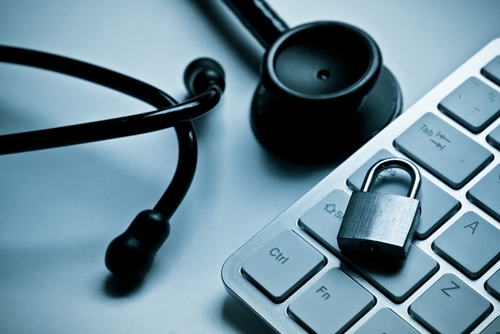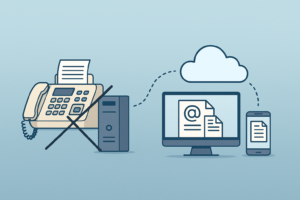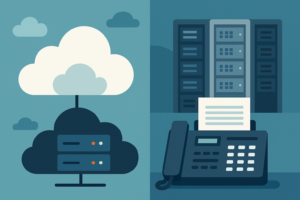As technology continues to rapidly evolve and change, many business sectors are finding it hard to keep up. All the acronyms and trends begin to blend together and it can be difficult to see the advantages of change. That said, there is one specific pairing of technology and industry that works perfectly: health care and fax over IP.
Due to intense regulations laid out by the Health Insurance Portability and Accountability Act, those in the medical field must follow strict rules when it comes to transferring documents containing patient information. Legacy fax systems are certainly useful in completing this task, but fax machines in healthcare are extremely outdated. To that end, let’s take a look at the top three benefits health care providers can get out of a FoIP solution.
1. Greater security
Considering how much personally identifiable information is contained within medical records, it isn’t surprising that security is a huge concern within the health care field. To begin, it’s important to note that while legacy fax systems do help mitigate the risks of something like a man-in-the-middle attack, they also have their limitations.
Specifically, fax machines have a glaring problem in the form of physical document security. When a record is sent, there’s a good chance it might have to sit a while until an employee notices it. If the machine is in an area with a lot of foot traffic, someone would have the ability to either glance at the document or even snatch it without anyone noticing. Depending on the medical record being sent, this could translate to a major data breach.
So, if legacy fax systems have such a problem, why not rely on email? While email may be much more efficient than older fax machines and more physically secure, it is by far one of the least digitally safe ways to move important information. Even if you and your employees utilize solid, hard-to-guess passwords, relying on email creates a greater chance for a phishing scam to become successful.
As it stands, one of the biggest threats facing health care right now is ransomware, which is where the hacker gets his victim to download a piece of malware that encrypts all of the user’s data until the criminal is paid a hefty sum of money. Getting paid is the easy part; the hard part of these schemes is getting the person to actually download the malware. Sending an official-looking email reminiscent of a phishing scam is one of the most efficient ways to do this, with a report from PhishMe having found that 93 percent of all phishing emails ask the victim to unknowingly download a piece of ransomware.
 FoIP is all about security.
FoIP is all about security.According to a survey from HIMSS Analytics and Healthcare IT News, more than half of medical organizations within the study were the victims of a ransomware intrusion within the past 12 months, with an additional 25 percent having no idea whether or not they had been involved in an attack like this. Considering the gravity of a ransomware infection, coupled with the massive number of phishing emails being sent out with this malware, relying on email to move important information around simply isn’t an option.
FoIP, on the other hand, completely avoids all of these problems. Faxes are sent via the internet, meaning documents won’t be sitting in the machine waiting for a nefarious individual to spy on them. On top of that, FoIP sidesteps the problems associated with email by protecting you from the ransomware infections associated with phishing schemes and leads to effective communication between healthcare professionals.
2. Decreased time wasted looking for older paper documents
Health care is an extremely fast-paced industry, and workers are very often strapped for time. Taking care of patients is a full-time job and then some, which means medical facilities should be doing everything they can to increase efficiency. Sadly, many are unable to improve their service significantly due to the fact that they are still relying on paper documents.
“Health care is an extremely fast-paced industry.”
The reason these kinds of records are so inefficient is that they are much harder to search through than other forms of digital storage. An archive may be filed alphabetically, but there’s no guarantee that every piece of paper is exactly where it’s supposed to be. What’s more, putting multiple documents away is just going to waste time that hospital employees already have too little of.
This is why FoIP is so much better than legacy health care faxing systems. While these older machines force workers to file the paper messages for later review, FoIP systems automatically archive any record the organization would need to revisit at a later date. What’s more, this list is completely searchable, which means employees can find the exact document they’re looking for at a fraction of the time they’d spend if they were looking through a paper filing system. This not only lowers frustration and stress for workers, it also decreases overall costs as these people can focus on more important work tasks.
3. Ability to review medical records anywhere at anytime
Being a medical professional requires constant vigilance. This is especially true of doctors, who may have to look over an important medical record when they are in an inconvenient location such as on vacation. Previously, this meant these employees would have to be near a fax machine, which is once again a major waste of time.
Now, with the help of FoIP, these professionals have the ability to look over documents whenever they so choose. FoIP allows workers to log into the messaging portal from any web browser, cutting down on the inefficient activity of waiting around for a fax. What’s more, it also gives employees more flexibility in terms of document transfer and review. Regardless of where the doctor is or what time it is, FoIP can ensure she has the information necessary to help ensure the proper treatment of her patient.
Enhance enterprise communication, collaboration and compliance efforts with proven, HIPAA compliant fax services for healthcare organizations from FaxCore. Contact FaxCore today to learn more about their ‘Partly-Cloudy’ fax solutions.
| Legacy fax systems are certainly useful in completing this task, but they’re extremely outdated. |





